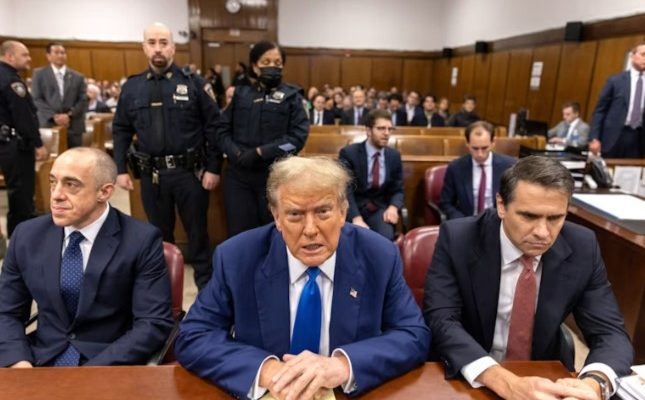In a dramatic and concerning turn of events, former President Donald Trump delivered a speech in Tucson, Arizona, which marked his first public appearance since a debate loss to Vice President Kamala Harris. The speech, instead of rallying supporters, sparked widespread alarm and left many questioning Trump’s mental and emotional state.

After his defeat in the debate, where Harris gained the upper hand, Trump took to the stage, launching into an erratic, grievance-filled rant. One of the most noticeable aspects of the speech was Trump’s fixation on past slights and a complete refusal to acknowledge any mistakes or defeat. He repeatedly whined about what he considered to be unfair treatment, notably targeting major networks like ABC, which he criticized for what he called a “horrible debate.” His comments about the moderators were scathing, calling for their firing and labeling them as biased.
In one particularly bizarre moment, Trump relived a past interaction, where he described a female moderator as looking at him with “hatred in her eyes.” This personal attack exemplified a broader theme of the speech, where Trump seemed unable to let go of past grievances, portraying himself as a perpetual victim. His language was petulant, bitter, and, at times, incoherent.
Trump’s Arizona speech also showcased his growing disconnect from reality. At one point, he claimed to have won the recent debate against Harris, describing it as a “monumental victory.” This assertion flew in the face of polling data and public opinion, which overwhelmingly showed Harris as the debate’s victor. Trump’s refusal to acknowledge his loss and his insistence on rewriting the narrative raised alarms among political analysts and the general public alike.
The speech took a further strange turn when Trump began to mock Harris, accusing her of offering “empty rhetoric” while boasting about his supposed policy prowess. However, Trump’s own speech was devoid of substance, filled instead with personal attacks, vague promises, and repeated complaints about the media. His comments oscillated between bizarre tangents and moments of delusion, with Trump at one point asserting that he had left it all on the field, boasting about his ability to hold multiple rallies in a day—comparing his stamina to President Biden’s.
The former president’s emotional outbursts, combined with his inability to stay on message, were concerning to many. He repeatedly attacked “fake news” media, referring to journalists and media outlets in ways that seemed to suggest paranoia. Trump’s tendency to claim that everyone, from media outlets to debate moderators, was conspiring against him painted a troubling picture of a man increasingly out of touch with reality.
One of the more disturbing aspects of Trump’s speech was his promotion of false and xenophobic conspiracy theories. Trump ranted about supposed incidents involving illegal immigrants, particularly targeting Haitian migrants. In a shocking claim, he accused Haitian immigrants of “destroying” the town of Springfield, Ohio, alleging that they had even begun stealing pets. Local officials and news outlets have thoroughly debunked these allegations, calling them inflammatory and dangerous.
These unfounded claims only added to the growing concern surrounding Trump’s mental state. His insistence on spreading baseless conspiracy theories, even after they had been disproven, raised questions about his capacity to engage in rational discourse. Furthermore, by promoting fear and xenophobia, Trump risked further inflaming divisions within the country, with his rhetoric pushing the boundaries of what even his most ardent supporters could tolerate.
As the speech dragged on, Trump’s rambling only became more disjointed. At one point, he launched into a bizarre tangent about the “size of the crowd,” insisting that Harris had no supporters and that her campaign was paying to bus people into her events. His obsession with crowd sizes has been a running theme throughout his political career, but this time, it seemed particularly disconnected from the reality of his declining support.
Critics of the former president, including political commentators, have expressed their concern about how Trump continues to present himself as a victim while portraying Harris and other opponents as incompetent or malicious. Ron Filipkowski, a prominent legal analyst, summed up the growing sentiment, remarking that it was baffling how anyone could view Trump—whom he described as a “soft, weak, pampered crybaby”—as a tough, alpha male figure.
For many watching, the speech wasn’t just another example of Trump’s characteristic bravado and bluster—it was a troubling sign of deeper emotional and psychological distress. Trump’s inability to process his debate loss, combined with his penchant for lashing out at anyone he perceives as an enemy, has led to growing speculation about his mental fitness. This concern was exacerbated by his increasingly erratic behavior on social media, where he continued to amplify conspiracy theories and bizarre memes.
As the 2024 election looms, Trump’s behavior in Tucson has only deepened the rift within the Republican Party. While his core supporters remain loyal, there is a growing sense that Trump’s erratic conduct may be becoming too much for the party to handle. His repeated attacks on the media, his inability to focus on policy, and his fixation on conspiracy theories have left many wondering if Trump is capable of leading a coherent campaign, let alone the country.
In the days following the speech, political analysts and mental health experts have called for a more serious examination of Trump’s mental state. While his behavior has often been erratic, his Arizona meltdown appeared to cross new lines, raising concerns about his suitability for public office. As the political landscape continues to evolve, one thing is clear: Trump’s Arizona speech was less a rallying cry for his base and more a cry for help, signaling that something is deeply amiss with the former president.



